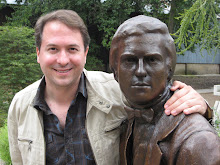A punt is a small wooden flat-bottomed boat that is used for navigating small rivers and shallow water. They are propelled by use of a long pole that is used to push off against the river bed. Navigating the river on one of these boats is called "punting", and there was no way I was visiting Cambridge without giving it a try!

"Punting is not as easy as it looks. As in rowing, you soon learn how to get along and handle the craft, but it takes long practice before you can do this with dignity and without getting the water all up your sleeve." –
Jerome K. Jerome, Three Men in a Boat (1889)

The view under the bridges of Cambridge

King's College Chapel from the river Cam
I'd love to know who is reading this blog. It would be much appreciated if you could take a minute and add a comment (just click on the word "comments" below this post) to just tell me who you are and where you are reading this from. Thanks so much! -Greg





I'm reading from Bozeman, Montana, though I was just in Cambridge for the Darwin in the Field conference at the Sedgwick Museum. Just posted my first post about my trip:
ReplyDeletehttp://thedispersalofdarwin.wordpress.com/2009/07/18/cambridge-trip-1-traveling/
And my pictures showing punting, although I did not try it:
http://www.flickr.com/search/?w=7230309@N05&q=punt&m=text
I am an uneducated follower of all things 'scientific', love Darwin and Richard Dawkins is a brilliant writer and speaker (on Ted.com and Christmas Lectures?) although how he hasn't been shot by some crazy American - I will never know!
ReplyDeleteWish there were video links to the talks so that I could have watched them! :(
Good news DW! From the Darwin Festival website (http://www.darwin2009.cam.ac.uk/):
ReplyDelete"We have made recordings of all the day-time sessions and we also have over 24 hours worth of interviews with speakers and delegates. Once this has been edited, which may take some time, this resource will be made available via the Festival website as well as a number of other channels.
We are also putting a Festival photo gallery together which will be accessible online soon."
I'll let you know on my blog as soon as these videos go live.
Greg
Hello,
ReplyDeleteI am reading this from very far away... the Dunbar area of Vancouver. My husband, our six year old son and I were in Cambridge this summer and saw the Sedgewick Museum display on Darwin. Until having our son I have to admit I never gave much time to the natural world. I am now very much a convert.
We spent a week and a half fossil hunting in Lyme Regis on the south coast of England mostly as a result of our son's keen interest in fossils.
We're excited to hear about the new museum at UBC as Thomas (our son) is crazy about the Natural History Museum in London. Whenever we go over to Britain to see family it is the first thing he wants to do on vacation!
Since returning from our trip we've had to buy a large cabinet to hold his collections of items he's found since age 4.
He has collected crab pincers and shells; bones of various animals; bivalves; ammonites; belmnites; and our fossils. He can tell you what crab any pincer comes from or a great many fossils. This interest has been completely self-directed (although his dad is a neuroscientist).
He is keen to listen to the lectures from the Darwin conference.Thank you for putting up this very user-friendly blog. It has been very interesting.
Olivia